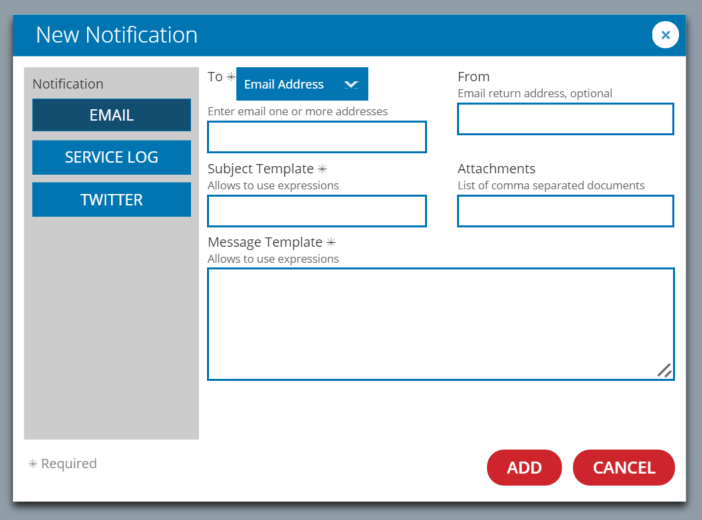Notifications
Notifications are the actual messages or logs that are sent out in response to special issues or situations in the system. As discussed on the Event Types page, System Events are triggered automatically in response to pre-defined situations in the system, and Service Events are triggered by Routines based on user-defined configuration. By default, System Events and Event Types are empty, and so do nothing. However, on the Configure > Notifications page, a user can add one or more Notifications to System Events or Event Types.

There are three types of notifications that can be sent in response to an event.
An email notification is, quite simply, an email that gets sent out by the system. The user must specify a subject line and body for the email, and can configure them using Expression Language; if the notification is being added to an Event Type, this EL expression has access to all the variables defined in the Event Type. The user can optionally specify the source address of the email. Most importantly, though, the user must specify the recipient of this email message. There are four types of recipients to which the system can send an email. First, the recipient can be one or more raw email addresses separated by commas; the system will validate that each has correct format, but not that each is an actual address. Secondly, the system can send an email to a specific account user, which contains an email address. Third, the user can select "By Event Property", in which case the email will be sent to the address or user specified in the selected field of the Event Type to which the notification is added. Lastly, the system can send an email to a Distribution List. These are described in detail on the Distribution Lists page, but in short, a Distribution is a user-defined list of account users and/or raw email addresses. By adding a Distribution List as the recipient of an email notification, that email gets sent to every address and user in that list.
Service Log
A Service Log is a notification that does not get sent out of the system, but instead simply logs an event with a custom message within the system itself. Like the body of an email notification, this log message is configurable using EL, and has access to any fields defined by the Event Type that contains the notification. As will be discussed in greater detail on the Event Log page, a default record of all System Events is stored on the Monitor -> Event Log page, but adding Service Log notifications to an Event Type allows Service Events to be recorded here as well; adding a Service Log to a System Event will cause the event to be recorded twice, but the Service Log allows the event to be recorded with a custom message instead of the brief default message.
A Twitter notification is a notification that gets posted to Twitter whenever its parent System Event or Event Type is triggered. A user must provide the notification with access information for the Twitter account from which the user wishes the notification to be posted; this includes the Access Token, Access Secret, Consumer Key, Consumer Secret, and Account Name fields. Then, the user must provide the details of the message itself: the message text, location of origin of the message, and, optionally, the name of an image from the media library to include with the message.
Zendesk
A Zendesk ticket can also be generated in response to a System or Service Event. You must provide the credentials and information for an existing Zendesk account, including the account name, access token, and server address. Beyond that, this type of notification is similar to an email notification, in that you must provide a subject template and message template, and you can reference any document in the document library by name to attach it to the message.